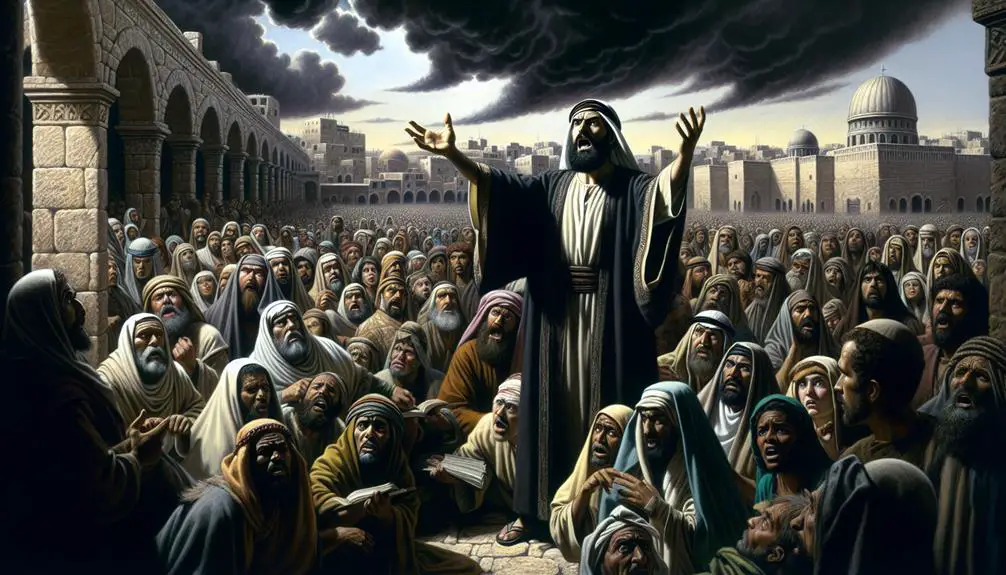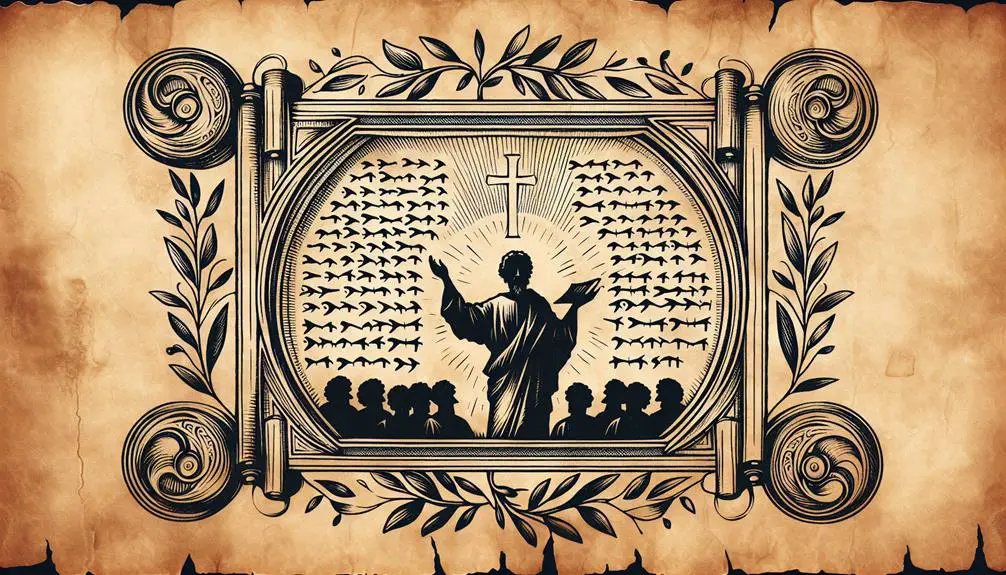Learn about Agabus, the biblical prophet who foresaw famine and Paul's imprisonment, and uncover his mysterious yet crucial role in early Christianity.

Who Was Agabus in the Bible
Interestingly, you might have stumbled upon the name Agabus while flipping through the Acts of the Apostles, yet his significance often remains overshadowed. Agabus stands out as a Christian prophet in the early church, known for his predictions that had profound implications, including a famine that indeed came to pass and a prediction about Paul's imprisonment.
These moments not only showcased his prophetic gifts but also highlighted his pivotal role in the nascent Christian community. Understanding Agabus's contributions offers a fascinating glimpse into the dynamics of prophecy and leadership within early Christianity.
Discovering his story might just change how you perceive the interplay between faith and foresight in the biblical narrative.
Key Takeaways
- Agabus was a Christian prophet known for predicting a widespread famine and Paul's imprisonment.
- His prophecies, validated by historical events, showcased his divine gift and accuracy.
- Agabus played a crucial role in guiding early Christians through difficult times with actionable predictions.
- His legacy influences modern Christian thought on the role and impact of prophecy.
The Identity of Agabus

Within the New Testament of the Bible, Agabus emerges as a prophet known for his predictive revelations concerning the early Christian community. You'll find that the exploration of Agabus's origin and prophetic methods offers a fascinating glimpse into the role of prophecy in the nascent Christian tradition.
Agabus's origin, while not extensively detailed in the biblical texts, situates him within the early Christian community that experienced direct influence from the Holy Spirit. His role as a prophet is significant, as it underscores the continuation of prophetic traditions within the early Church, transitioning from the Old Testament prophets. This transition showcases the evolving nature of prophecy, adapting to the needs and contexts of a growing Christian community.
His prophetic methods are particularly noteworthy. Unlike the often complex and symbolic prophecies of the Old Testament, Agabus's predictions are direct and actionable. This shift in prophetic delivery reflects the early Christian community's urgent need for guidance and clarity amidst persecution and uncertainty. It's this pragmatic approach to prophecy that not only demonstrates Agabus's unique role within the community but also highlights the adaptability of prophetic gifts in serving the Church's immediate needs.
In analyzing Agabus's identity, one observes a bridge between the Old and New Testament prophetic traditions, offering insights into the dynamic and evolving nature of prophecy within Christianity. His contributions, though briefly mentioned, provide a significant understanding of how prophecy functioned as a guiding and unifying force for the early believers, navigating through the challenges of their time.
Agabus in Acts of the Apostles

Exploring Agabus's specific appearances in the Acts of the Apostles reveals his critical role as a prophet within the early Christian narrative, offering clear, actionable guidance during pivotal moments. His contributions are marked by prophetic accuracy and significant Apostolic interactions, underscoring the depth of his involvement in the unfolding Christian story.
- Prophetic Accuracy: Agabus stands out for his unerring ability to foretell future events. This gift of prophecy, while not uncommon in biblical texts, is particularly noteworthy in the context of Agabus due to the direct impact his predictions have on the early Christian community. His accuracy not only validates his own prophetic calling but also serves as a divine endorsement of the fledgling Christian movement.
- Apostolic Interactions: Agabus's interactions with key figures in the Acts of the Apostles, notably the Apostles themselves, highlight his importance within the nascent Christian community. These encounters aren't casual mentions but pivotal moments that often lead to significant decisions or changes in direction for the early Church.
- Guidance During Pivotal Moments: The Acts of the Apostles documents several critical junctures where Agabus's prophetic insights provide necessary guidance. His role during these times isn't passive; he actively contributes to the decision-making processes with his prophecies.
- Integration into the Early Christian Narrative: Agabus is seamlessly woven into the broader narrative of early Christianity. His presence and actions link the prophetic traditions of the Old Testament with the emerging Christian faith, reinforcing the continuity and evolution of divine interaction with humanity.
Prophecies of Agabus

You'll find that Agabus's prophecies, namely his famine prediction and foretelling of Paul's future, stand as significant narratives within the biblical text. These episodes not only underscore his role as a prophet but also reflect the broader dynamics of divine communication in early Christianity.
Analyzing these prophecies allows us to appreciate the depth of Agabus's impact and the theological implications of his visions.
Agabus's Famine Prediction
Agabus's prediction of a widespread famine, as recorded in the Acts of the Apostles, showcases his prophetic gift and the early Christian community's response to prophetic messages. This incident is significant for several reasons:
- Meteorological Analysis: Agabus's prediction implies a level of understanding or insight into climatic conditions that could affect an entire region.
- Agricultural Strategies: It underscores the importance of agricultural practices in sustaining communities, hinting at the need for strategic planning in response to prophetic warnings.
- Community Mobilization: The early Christians' reaction to Agabus's prophecy illustrates the proactive steps taken to mitigate the impact of the predicted famine.
- Role of Prophecy: This event highlights the function of prophecy in guiding and preparing communities for future challenges, emphasizing the spiritual and practical aspects of faith.
Paul's Future Foretold
Building on his established credibility, Agabus further demonstrated his prophetic gift by foretelling significant events in Paul's future, marking another critical instance where prophecy shaped the early Christian narrative. His prediction of Paul's imprisonment in Jerusalem not only showcased his prophetic accuracy but also underscored the inherent risks of apostolic ministry in the nascent church.
Agabus's prophecy, detailed in the Acts of the Apostles, involved taking Paul's belt and binding his own feet and hands, symbolically illustrating Paul's forthcoming capture and bondage. This act of prophecy wasn't for deterrence but preparedness, reinforcing the resolve of Paul and his companions.
Agabus's foresight into Paul's future exemplifies the role of prophecy in guiding and fortifying the early Christian community amidst persecution and uncertainty.
The Famine Prediction

You'll find that Agabus's prediction of a famine, as recorded in the Acts of the Apostles, holds significant weight in both theological and historical discussions. His prophetic vision not only demonstrated his divine gift but also aligned with known historical accounts of famines in the Roman Empire.
This intersection of prophecy and historical validation offers a compelling area for scholarly examination.
Agabus's Prophetic Vision
In the New Testament, Agabus emerges as a prophetic figure who accurately predicts a severe famine that would affect the entire Roman world, an event that later historical records confirm. This instance not only underscores his prophetic accuracy but also highlights the importance of vision interpretation within a biblical context.
Consider these aspects of Agabus's vision:
- Prophetic accuracy: His prediction came true, demonstrating his genuine prophetic gift.
- Vision interpretation: Understanding and conveying the vision's meaning was crucial.
- Impact on the early church: The prediction prompted early Christians to prepare.
- Historical significance: This prophecy aligns with known historical events, reinforcing the interconnectedness of biblical narratives and historical facts.
Analyzing Agabus's vision offers insights into the dynamics of prophecy within the early Christian community.
Famine's Historic Validation
Reflecting on Agabus's prophetic vision, it's essential to examine the historical validation of the famine prediction to understand its impact and accuracy. Analyzing climate patterns and archaeological evidence sheds light on this biblical event's historical context.
Scientific studies of climate patterns during that era corroborate a significant shift, likely leading to widespread crop failures. Archaeological evidence further supports this, with findings indicating a reduction in agricultural production.
These pieces of evidence collectively validate the accuracy of Agabus's prophecy, illustrating a period of hardship that aligns with the biblical account. This analytical approach demonstrates not only the prophecy's historical credibility but also the profound effect such events had on ancient societies, reinforcing the significance of Agabus's warning in a scholarly and objective manner.
The Binding of Paul

Agabus's prophetic act of binding his own feet and hands symbolizes the future arrest and persecution that Paul would face in Jerusalem. This moment isn't only pivotal in the narrative of Paul's ministry but also highlights the inevitability and the consequences of his mission in spreading the gospel. As you delve into this event, it's crucial to understand its implications on Paul's travels and eventual Roman custody.
Here are four key points to consider:
- Prediction of Persecution: Agabus's demonstration was a direct prophecy of the hardships Paul would encounter. This act served as a tangible representation of the challenges lying ahead, specifically signaling that Paul's journey to Jerusalem wouldn't be without peril.
- Paul's Resolve: Despite the prophecy, Paul's determination to continue his mission underscores his unwavering commitment to his faith and the spread of Christianity. This moment exemplifies Paul's readiness to face imprisonment and suffering for the sake of his beliefs.
- Impact on Paul's Travels: The prophecy foretelling Paul's binding and subsequent Roman custody significantly influenced his travels. It marked a turning point, steering his journey towards Rome, where he'd eventually stand trial.
- Roman Custody: The transition into Roman custody was a critical phase in Paul's ministry. It not only fulfilled Agabus's prophecy but also opened new avenues for Paul to preach the gospel, even under incarceration.
Understanding the binding of Paul through Agabus's prophetic act offers insight into the challenges and resilience in early Christian missions. It highlights the intertwining of faith, prophecy, and the relentless pursuit of spreading the gospel against all odds.
Impact on Early Christianity

The prophetic actions of Agabus and the subsequent events in Paul's ministry had a profound impact on the trajectory of early Christianity, demonstrating the religion's resilience and adaptability in the face of persecution. Agabus's prophecies, especially his vivid portrayal of Paul's impending hardships, served as early encounters with the spiritual realm that underscored the nascent faith's direct connection with divine guidance. This spiritual influence was pivotal, as it fortified the early Christians' resolve, preparing them for the trials they'd face in spreading their message.
Agabus's role in the Acts of the Apostles showcases the critical function of prophecy within the Christian community. His forewarnings didn't deter Paul or his companions; rather, they emboldened them, highlighting a unique aspect of early Christian identity—embracement of suffering for the sake of their beliefs. This readiness to face persecution head-on, with the belief that their paths were divinely ordained, was a cornerstone of early Christian resilience.
Furthermore, Agabus's interactions with the early church leaders, including Paul, facilitated a deeper understanding of spiritual influence during critical moments. These interactions weren't merely incidental; they were foundational, helping to shape the early Christian ethos of trust in divine providence. This trust was essential not only for facing persecution but also for navigating the internal and external challenges that threatened the young movement's survival and growth.
In essence, Agabus's prophetic ministry contributed significantly to the spiritual fortitude of early Christianity. His ability to bridge the human and divine realms through prophecy reinforced the early Christians' commitment to their faith, even in the face of severe challenges, thereby influencing the religion's development and expansion.
Agabus's Legacy

Throughout history, the legacy of Agabus has endured as a testament to the enduring power of prophecy in shaping Christian thought and identity. His role as a prophet in the early Christian church highlights the significance of prophetic messages in guiding and forewarning communities. Modern interpretations of Agabus's prophecies offer a window into the complexities of biblical narratives and their applications in contemporary faith practices.
Analyzing Agabus's legacy, we find several key aspects that have contributed to his lasting impact:
- Prophetic Accuracy: Agabus's predictions, such as the famine that spread across the Roman world and the arrest of the Apostle Paul, showcase the precision of his prophecies. This accuracy has bolstered faith in the reliability of biblical prophecy among believers.
- Guidance for Early Christians: His prophecies provided essential guidance and preparation for early Christians, helping them navigate challenges and reinforcing the importance of community support and resilience.
- Influence on Theological Thought: Agabus has influenced Christian theological thought, especially in discussions about the role of prophecy in the church and how divine messages are interpreted and acted upon.
- Modern Interpretations: His story continues to inspire modern interpretations, offering insights into the nature of divine communication and the responsibilities of those who receive such messages. These interpretations encourage a reflective approach to understanding prophetic voices in contemporary contexts.
Agabus's legacy, underscored by his prophetic accuracy and the depth of his influence, remains a significant subject of study and contemplation within Christian scholarship, shedding light on the enduring relevance of prophecy in shaping faith and community identity.
Reflections on Prophetic Roles

Reflecting on prophetic roles, it's crucial to understand how these figures have historically shaped religious narratives and community actions. Prophets, like Agabus from the biblical times, served as conduits for divine messages, often influencing the course of history through their predictions and guidance. Their roles weren't just confined to foretelling future events; they also played a significant part in guiding communities, shaping moral values, and challenging societal norms. This multifaceted role underscores the depth of their impact on both spiritual and societal levels.
When you consider the modern implications of prophetic roles, it's essential to evaluate the accuracy and relevance of their messages in today's context. Prophetic accuracy, a critical measure of a prophet's legitimacy in biblical times, remains a pertinent criterion for assessing the value and impact of modern prophetic voices. In a world where information is abundant yet often misleading, discerning the truth and relevance of purportedly prophetic messages is more challenging yet more crucial than ever.
The role of prophets today extends beyond religious boundaries, influencing socio-political and cultural realms. Their ability to inspire, challenge, and mobilize communities speaks to the enduring power of prophetic voices in shaping human consciousness and action. However, in this analysis, it's vital to approach modern prophetic claims with a critical eye, evaluating their integrity, authenticity, and alignment with ethical and moral principles.
Frequently Asked Questions
How Does the Portrayal of Agabus Compare to Other Prophets in Non-Biblical Historical Records of the Same Era?
When you delve into comparative methodology, it's clear that Agabus's portrayal differs from other prophets in non-biblical historical records of the same era.
While prophet dynamics usually involve direct divine messages or guidance, Agabus's role, as seen through a scholarly lens, emphasizes foretelling specific events rather than offering moral or ethical guidance.
This analytical perspective highlights a unique aspect of prophetic activity not always mirrored in contemporaneous accounts outside the biblical narrative.
Were There Any Specific Rituals or Practices Agabus Might Have Followed Before Delivering His Prophecies?
As they say, 'Actions speak louder than words,' and this rings true when considering prophetic symbolism.
It's likely that Agabus engaged in ritualistic fasting before delivering his prophecies, a common practice among prophets to purify themselves and seek divine clarity.
While the Bible doesn't detail his specific rituals, the emphasis on such practices in ancient texts suggests a dedication to spiritual preparation, aligning with the broader tradition of prophetic acts.
Is There Any Archaeological Evidence That Supports the Existence or the Prophecies of Agabus?
You're diving into whether archaeological methodologies have ever validated the prophecies of a historical figure. While intriguing, it's challenging to directly connect archaeological findings with specific prophecies due to the abstract nature of prophetic messages.
The evidence usually offers insights into the historical context rather than direct prophecy validation. Thus, while archaeology can illuminate the era, directly linking it to the accuracy of prophecies remains a complex task.
How Has Agabus Been Depicted in Christian Art and Literature Throughout the Centuries?
Throughout centuries, like a painter blending colors, artists and writers have woven Agabus into their tapestries of creativity using various art techniques and exploring deep literature themes. You'll find his prophetic presence captured in frescoes, illuminated manuscripts, and sculptures, each piece offering a unique interpretation of his biblical story.
Similarly, in literature, his narrative has been analyzed and retold, enriching theological discussions and inspiring believers with its timeless relevance and spiritual depth.
What Are the Theological Implications of Agabus's Prophecies on Contemporary Christian Thought and Doctrine?
You're examining how Agabus's prophecies influence contemporary Christian thought and doctrine.
In exploring modern interpretations, you'll find his predictions stir significant doctrinal impact, particularly in understanding prophetic gifts and divine guidance today.
Scholars delve into these narratives, analyzing their relevance and application in modern faith practices.
This scrutiny reveals a nuanced perspective on prophecy, encouraging a reevaluation of its role and significance in shaping Christian beliefs and teachings.
Conclusion
In conclusion, Agabus stands as the biblical equivalent of a weatherman predicting storms with uncanny accuracy, yet his forecasts involve famines and bindings rather than rain or shine. His prophetic contributions, while perhaps not always the most welcomed news, significantly shaped early Christian narratives.
Through his unique blend of dire warnings and dramatic flair, Agabus not only left an indelible mark on the faith's early development but also provided a timeless lesson on the importance of listening to those oddballs who might just know what they're talking about.



Sign up